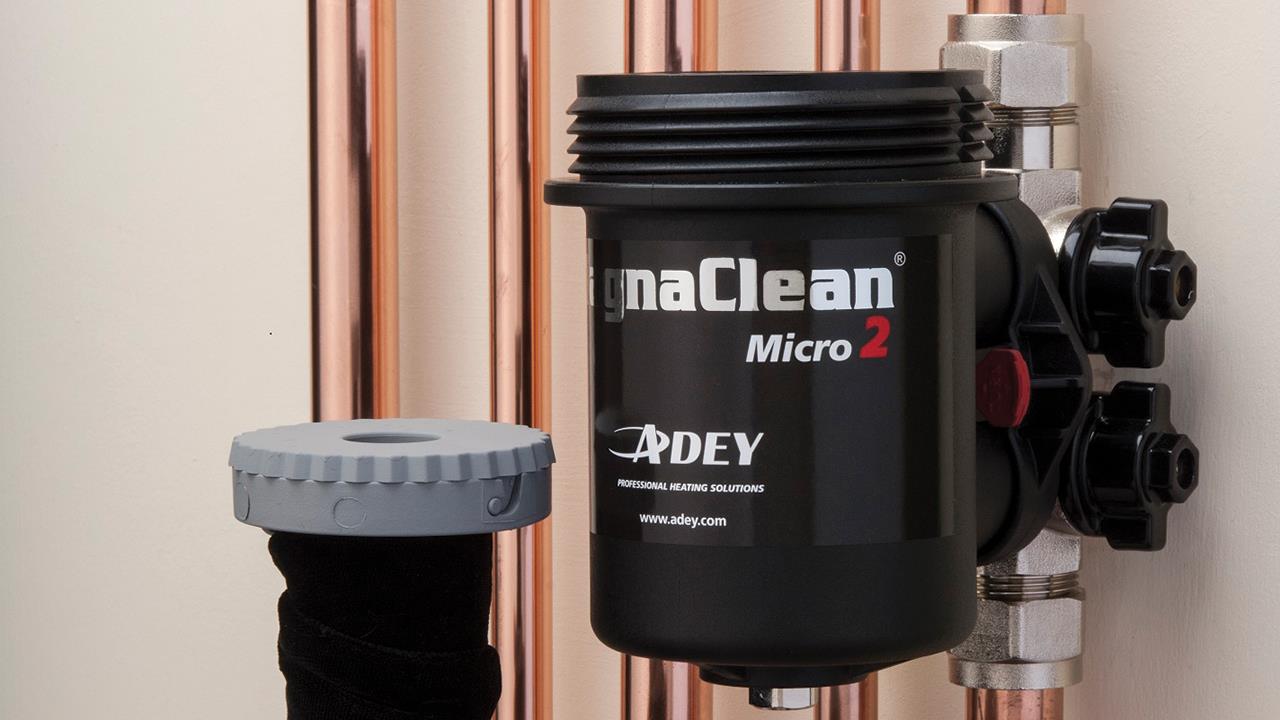

Ian Trott, Residential Training Manager at Baxi, explains how correctly fitting a filter is an integral part of the installation process, and what to keep in mind when installing one.
The benefits of a filter include increased boiler efficiency, a longer boiler lifespan, and lower energy bills. If installed incorrectly, however, filters can quickly cause issues such as poor performance.
With this in mind, it is important that heating engineers are able to advise customers on filters and know how to correctly install them.
How do filters work?
Apart from British Standard 7593:2019 stating that a filter should be fitted to protect system components, filters are crucial to a domestic heating system’s delivery of efficient space heating and hot water. Metals, water, and oxygen within the system can combine to cause corrosion and subsequent debris build-up, which in turn prevents the flow of water through the system and worsens overall performance. At best, this can prevent the radiators from effectively and quickly warming the home; however, at worst, this could result in the need for a costly boiler replacement.
Collecting magnetite and metallic debris using a magnet, filters are designed to clean the system as water flows through. Other contaminants and debris are collected and stored in a separate part of the unit, as water is spun in a cyclone through it.
While a filter is a crucial part of maintaining a healthy system, it does not replace vital system flushing. Whether attending callouts for servicing and maintenance or fitting a new boiler, where necessary engineers and installers should flush systems using an approved cleaner, fit a filter, and treat the water with an inhibitor.
Considerations for fitting
The best position for the filter is on the return pipe because this prevents debris from reaching the boiler. There are a variety of filters available on the market with different fitting requirements, with many only requiring a small section of pipe to be cut out for the filter to be installed.
Most filters have valves with a slip socket that helps to simplify the fitting process, which can be used to push the valves onto the pipe and pulled back to fit the gap. This means there is no requirement to adjust the position of any pipes once the section has been cut out.
Manufacturer instructions will provide guidance to help determine where to fit the valves, often using a locator guide to ensure correct alignment of connections. The guides can then be removed and the unit attached to the valves with a push-on fitting.
To help with servicing and maintenance after fitting, a collar that sits between the filter and the valves allows for easy removal of the filter. To make this process simpler, many filters come with collars with a hole and pin system to prevent accidental release of the unit. It is vital to ensure the collar is locked in correctly before commissioning the system.
Servicing and maintenance
Just the same as a boiler, filters should be serviced annually to clear out the build-up of debris collected in the unit. This provides an opportunity to demonstrate to the homeowner how much debris the filter collects, highlighting the key role it plays in keeping their heating system efficient and functional.
Though it doesn’t reduce the flow rate when at capacity, it is worth noting that filters will stop collecting debris if they become full, so a service is essential to maintain performance.
When it comes to servicing a filter, the part that collects debris is usually unscrewed over a bowl to release any water in it. Many of the units on the market feature a magnet that is removed with a spanner, allowing debris to be washed away. Before reassembling, it is important to check all the seals and the rubber O-rings for damage or debris that could cause leaks later on. It is worth having a seal kit handy to make any replacements.
Customer benefits
As well as improving efficiency, some insurance or boiler warranties are not valid if damage occurs when a filter has not been fitted. This is why Baxi provides an ADEY Micro 2 filter as standard with all Baxi 800 boilers. Repairs like a blocked heat exchanger could be expensive for the homeowner, so it is worth explaining the long-term benefits of fitting a filter.
By providing information to give more understanding around the importance of a filter, heating engineers and installers can build rapport and gain trust from their customer. In addition, it is an opportunity to outline the benefits, including reducing energy bills, increasing system efficiency, and minimising the risk of breakdown.
If you'd like to keep up-to-date with the latest developments in the heating and plumbing industry, why not subscribe to our weekly newsletters? Just click the button below and you can ensure all the latest industry news and new product information lands in your inbox every week.